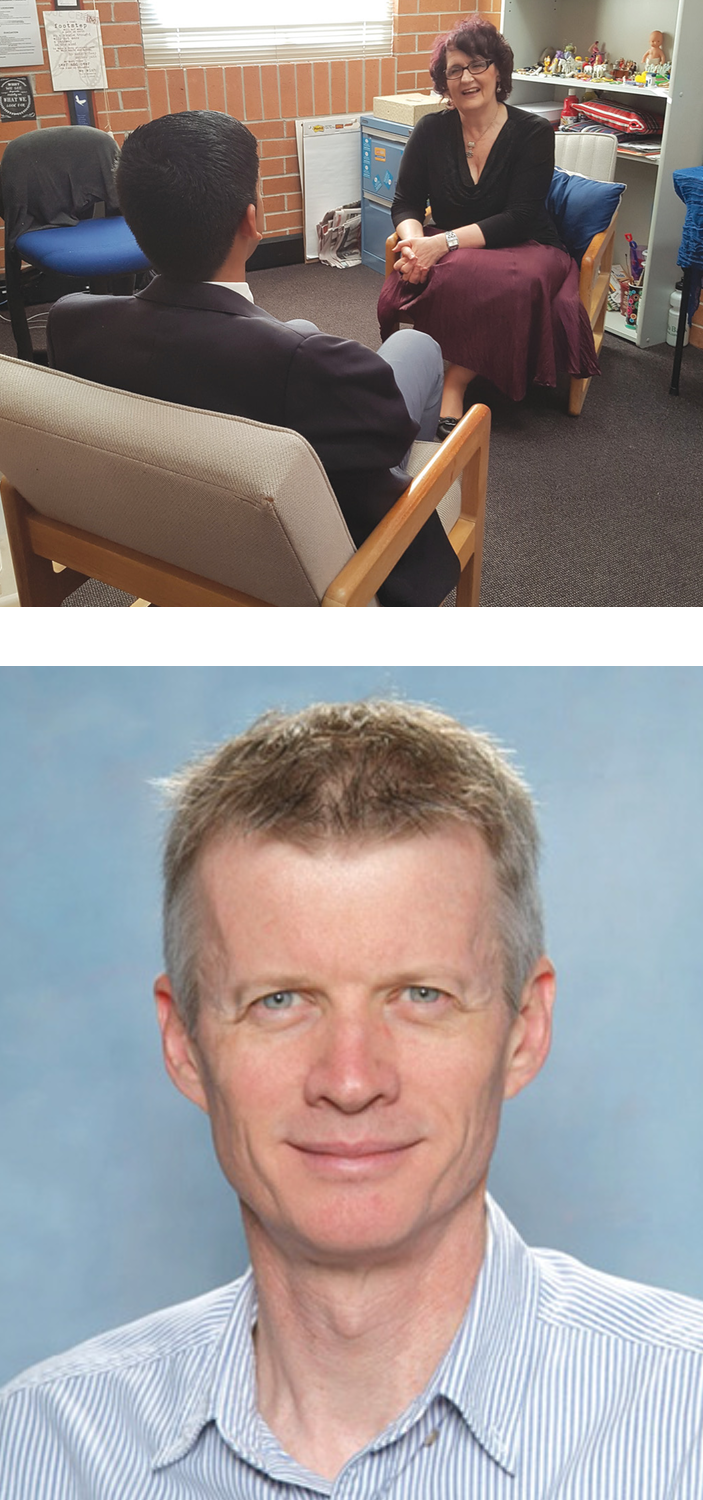In the non government system it’s been a bit more flexible. School counsellors can be former teachers, but they can also be from a counselling, social work or psychology background. They could have worked in the health system or in private practice.
Two counsellors who spoke with IE said this variety is a good thing for students.
Martin Graham is a counsellor for the Diocese of Parramatta in western Sydney. He is a former high school teacher who decided to move into counselling 20 years ago.
“I felt I could form better relationships with students and help them more in a one on one relationship,” Martin said.
He undertook a counselling course, followed by a Masters in Pastoral Guidance at the Australian Catholic University, finally qualifying as a psychologist in 2000.
Martin said the majority of his counsellor colleagues are not former teachers, and this has changed in recent years.
“Most come from a psychology or social work background and have not worked in schools before. The required level of qualifications has increased in recent years, reflecting an increased professionalisation of counselling. It is no longer expected that a teacher will move over from a pastoral role in a school to become the school counsellor.”
While someone from a health background may have initial challenges negotiating the way schools are run, in the long run there are no disadvantages, Martin said.
“There is less of an educational focus in terms of psychological testing carried out by counsellors in the non government system compared to the public system.
“The job is mostly working directly with students, or small groups of students, collaborating with staff and consulting on school wellbeing.
“It also involves working with parents to arrange referrals to other professionals, contributing to staff development and helping to manage serious incidents affecting the school.
“I also run a staff/student mentoring program at my school to provide extra support for selected students.”
Nowadays challenges faced by students have increased to include cyberbullying, and depression and anxiety are more common, as is discussion on sexuality and gender identity.
“There’s more awareness of mental health issues now, and kids will come to you with a self diagnosis of anxiety or depression – using that terminology – which never used to happen.”
Martin said he gets the most satisfaction from his work when he can connect with a student and change their perspective on a situation, or even change the situation altogether.
“Some students have few people in their lives they can talk to and raise issues with.”
Whole child
Sue Livingstone trained as an early childhood teacher and worked in infants (as it was then called) for about eight years before moving into counselling.
“I was always interested in the whole child, not just teaching them reading, writing and ‘rithmetic’,” Sue said.
“I went into natural therapies but found my interest was more on the emotional rather than the physical side. I decided to train as a counsellor and I got the position with CatholicCare in the Wollongong area.”
Sue’s time is shared between a high school and a primary school in the Diocese of Wollongong, with five days a fortnight at the high school and the equivalent of one and a quarter days a week at the primary school.
In her time with CatholicCare Sue has worked in many primary schools and also spent 11 years working in an independent school for students with an intellectual disability.
Along with other school counsellors who choose to do so, she also provides clinical and professional supervision to other school and generalist counsellors, CEO staff and workers from other organisations
She has worked at the same high school for 16 years and the primary school for three. CatholicCare provide counselling services to a number of dioceses in NSW and the ACT.
Sue said her colleagues are probably equally split with a third being counsellors, a third psychologists and a third social workers. Only two people on the present team are former teachers.
“One thing we’ve all got in common is we’re all passionate about helping children,” she said.
“It is not necessary to come from a school background.
“My colleagues come from a variety of backgrounds such as drug and alcohol, working with refugees, child protection or private practice,
“I think this is a positive for the profession and it brings a variety of points of view and opinions on how to deal with issues.”
Family breakdown and conflict in the home has been the main source of challenges for students throughout Sue’s 16 year career, along with dealing with grief and loss, anxiety and depression.
“Working with young people and assisting them find their way in the world is a privilege.”
While private practitioners and other external organisations also have an important role to play, Sue believes counsellors in schools are in a unique position to help students, compared with private practitioners.
“We are right on the school premises. We can deal with the issues as they arise.
“Referrals to outside practitioners are difficult for many families. Not everyone can afford it or are able to easily get away from work to take their children to see someone.
“Many of the most vulnerable students may have families who cannot access someone outside of school.
“I think it would be beneficial for the government to provide more financial support for school, TAFE and university based counselling and services as they provide such a crucial on site service.”
Support for counsellors
There are a number of professional associations that counsellors can belong to for support, in addition to the IEU. These include:
The Australian Psychological Society:
www.psychology.org.au/
The Australian Psychologists and Counsellors in Schools NSW:
www.apacsnsw.org.au/home
The Australian Association of Social Workers:
www.aasw.asn.au/



































































































































